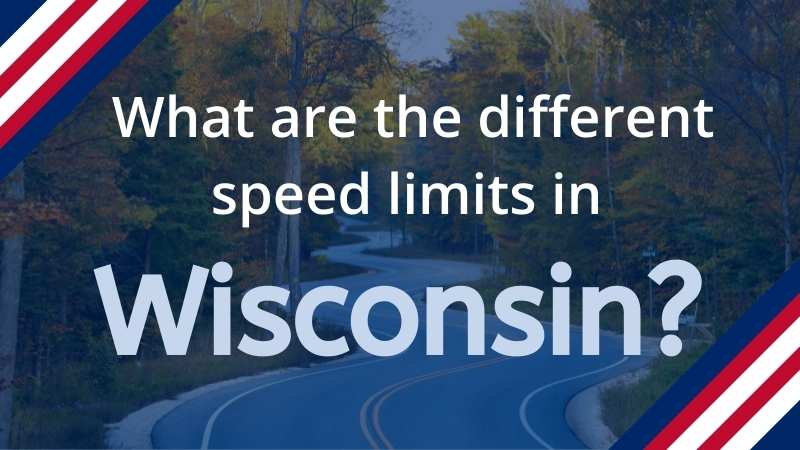Speed limits are undoubtedly far from the first think you will likely consider when traveling to or through such an awesome and beautiful state such as Wisconsin. However, the state’s traffic authority has set out clear guidlines and laws that must be abided by in order to avoid fines for yourself, insurance increases, and most importantly, accidents with other motorists.
If you are considering a move to Wisconsin from another state or country, driving through to reach another state such as Illinois, or travelling to the state for work purposes, possessing the correct knowlege of the speed limits in Wisconisn, and understanding which speed to go at on certain roads is pivotal information to have and follow.

Abiding by the correct speed limits in Wisconsin is not just about avoiding fines and penalties, it is also about driving safely on the roads, and in turn, avoiding accidents with other motorists. Driving within the speed limits set out does not only help reduce possible crashes, it promotes efficient use of roads.
Traffic laws, which include speed limits and other motor laws are established by the Wisconsin Department of Transportation. The state speed limits are defined by two different types of speed limits, basic speeding Wisconsin law, and absolute speed limits.
The basic speeding law prohibits driving “at a speed greater than is reasonable and prudent under the conditions and having regard to the actual hazards then existing”. This means that motorists must always drive at a safe speed for the conditions and environment they are driving in.
An example would be that if you were driving on a 55 mph road on a rainy evening in Wisconsin you would be required to slow down your speed to significantly less than the signed speed limit of 55 mph. This is because the weather and road conditions would be considered dangerous, and if you were caught driving at the signed limit, you may be slapped with a fine, and perhaps even worse consequences.
Wisconsin Speed Limits
The absolute speed limit in Wisconsin is the speed limit you see signposted on roadways, there is absolutely no trick, what you see is what you get, literally! If the weather conditions are ideal for driving you may drive at the maximum speed limit you see sign-posed. Surpassing the limit will likely cost you fines and other penalties.
Wisconsin does not possess the highest maximum speed limit in the U.S., in fact, there are 16 other states that all have a higher maximum speed limit. The maximum speed limit at which you can travel on certain roads in Wisconsin is 70 mph.
Here are the different speed limits to look out for in Wisconsin:
- 35 mph is the speed limit on residential roads (always double-check the posted speed limit).
- School, hospital, and construction zones all have lower speed limits than anywhere else in the state, so, keep a lookout for the signed limit when entering these areas.
- 55 mph is the maximum speed limit for undivided roads.
- 65 mph is the maximum speed limit for divided roads.
- The urban highway speed limit in Wisconsin is 65 mph.
- Rural highways in Wisconsin are 70 mph.
- The maximum truck speed limit in Wisconsin is 70 mph (some states have a lower limit).
When driving through residential areas and not a state highway, something to be aware of is schools, hospitals, and construction zones, as mentioned previously, these areas often have temporarily and permanently lowered speed limits and enforce these limits very strictly. You don’t want to receive a hefty fine or worse for not being aware of this.
Wisconsin Speed Limit Laws
In Wisconsin the speeding ticket you recieve will be dependant on the moving violation you commit. However, these can range in speeding ticket price based on a multitude of factors. Typically, fines will range between $30 to $300, this is obviously dependant on the circumstances, and how many you have recieved too. If you speed in especially sensative areas such as school zones you can expect to see the fines rise, and in some cases, doubled.
Wisconsin has a speeding point system extremely similar to the majority of other states, here is a table displaying the offense next to the number of speeding points that will be added to your license – remember, if you acquire a certain number of points over a 12 month period, expect penalties, or even a license suspension!
| Wisconsin Speeding Ticket Points | Total Points |
|---|---|
| Speeding 10 mph or less over limit | 3 |
| Speeding more than 10 but less than 20 mph over limit | 4 |
| Speeding 20 mph or more over limit | 6 |
| License not in possession | 0 |
| Failure to stop for accident | 6 |
| Eluding an officer | 6 |
| Operating while intoxicated | 6 |
| Racing | 6 |
| Reckless driving | 6 |
| Failure to stop at railroad crossing | 6 |
| Failure to maintain lane | 4 |
| Wrong side of highway | 4 |
| Speed too fast for conditions | 4 |
| Failure to stop for school bus | 4 |
| Failure to yield to emergency vehicles | 4 |
| Inattentive driving | 4 |
| Unnecessary acceleration | 4 |
| Graduated license restriction violation | 3 |
| Failure to dim lights | 3 |
| Failure to signal | 3 |
| Failure to obey traffic control device | 3 |
| Tailgating | 3 |
| Illegal turn | 3 |
| Improper brakes | 3 |
| Illegal passing | 3 |
| Driving while suspended or revoked | 3 |
| Obstructing traffic | 2 |
| All other moving violations | 2 |
When visiting, passing through, or relocating your family to the state of Wisconsin, it is a given to have your mind focused on fun things to do, or places you need to be. However, knowing what the speed limit in Wisconsin is – and adhering to the signed limits – will ensure your time is well spent and minimize the chance of you being fined or getting into an accident.


